Difference between revisions of "Creating a NEW Chart - OnePager Pro Add-in for Version 7.0"
(→Procedure) |
(→Procedure) |
||
| Line 33: | Line 33: | ||
<center>P70-7_1_1-70-(4)-08052019.png</center> | <center>P70-7_1_1-70-(4)-08052019.png</center> | ||
| − | 10) It is recommended that the chart name selected refer to both the project and, perhaps, the audience that | + | 10) It is recommended that the '''chart name''' selected refer to both the project and, perhaps, be familiar to the audience that is likely to view the completed OnePager chart. |
11) Additionally, notice that the '''Select Tasks with ‘YES’ in field:''' is showing '''Flag20''' as a default. | 11) Additionally, notice that the '''Select Tasks with ‘YES’ in field:''' is showing '''Flag20''' as a default. | ||
| − | 12) Most users select '''Flag20''' to tell OnePager which | + | 12) Most users select '''Flag20''' to tell OnePager which tasks and milestones to '''import''' but any of the 20 '''Flag''' fields or any of the 20 '''Number''' fields can be used. |
13) It is important that the '''Flag''' field number represented in this window correspond to the '''Flag''' field containing the '''Yes''' and '''No''' data placed in the Microsoft Project '''source plan'''. | 13) It is important that the '''Flag''' field number represented in this window correspond to the '''Flag''' field containing the '''Yes''' and '''No''' data placed in the Microsoft Project '''source plan'''. | ||
| − | 14) The '''Snapshot date''' represents the '''time now''' or '''as-of date''' for the | + | 14) The '''Snapshot date''' represents the '''time now''' or '''as-of date''' for the chart you are about to create. |
| − | 15) If the date created by OnePager does not reflect the '''status date''' required, change the date by using the '''calendar''' dropdown window. | + | 15) If the '''date created''' by OnePager does not reflect the '''status date''' required, change the '''date''' by using the '''calendar''' dropdown window. |
| − | 16) As the plan changes later on, you can create additional snapshots to show changes consistently. | + | 16) As the '''source plan''' changes later on, you can create additional snapshots to show changes consistently. |
17) Finally, note that the '''Show field mappings''' checkbox is checked as shown above. | 17) Finally, note that the '''Show field mappings''' checkbox is checked as shown above. | ||
| − | 18) Checking this checkbox and pressing the '''Next>''' button takes you to the form shown below: | + | 18) Checking this checkbox '''ON''' and pressing the '''Next>''' button takes you to the second page of the '''OPC''' form shown below: |
<center>[[File:P70-7_1_1-70-(5)-08052019.png]]</center> | <center>[[File:P70-7_1_1-70-(5)-08052019.png]]</center> | ||
<center>P70-7_1_1-70-(5)-08052019.png</center> | <center>P70-7_1_1-70-(5)-08052019.png</center> | ||
| − | 19) This allows you to | + | 19) This form allows you to '''edit''' which Microsoft Project '''source plan''' fields are used for various purposes such as '''task name''' and '''start date'''. |
20) The '''Edit current template''' button also gives you a second chance to change many more initial properties of the chart. | 20) The '''Edit current template''' button also gives you a second chance to change many more initial properties of the chart. | ||
Revision as of 17:20, 4 May 2020
Overview Flow Chart
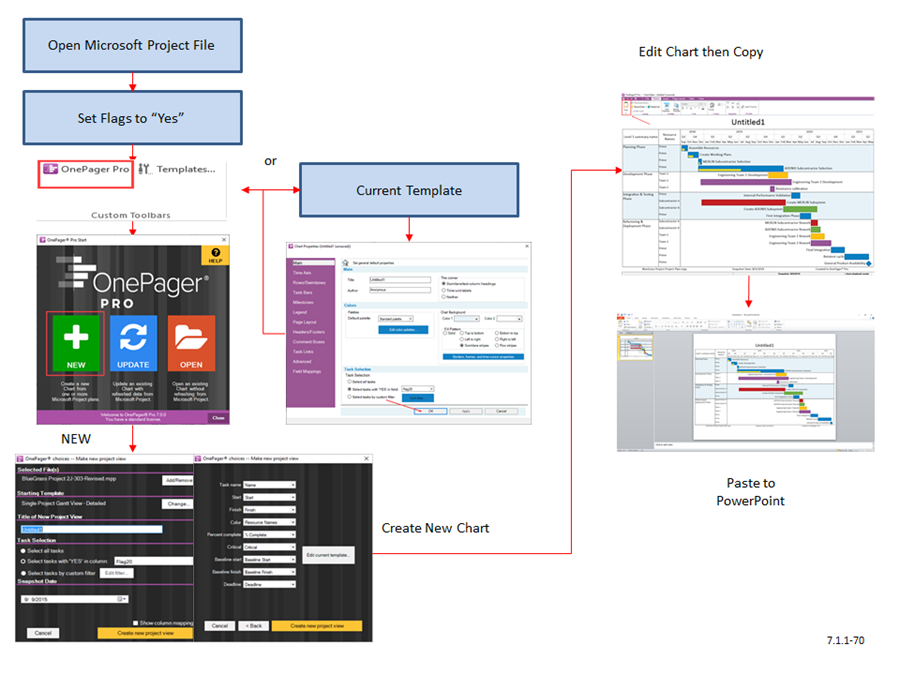
Procedure
1) Launch Microsoft Project and access the required Microsoft Project source plan.
2) Set the Flags/Numbers field into the Microsoft Project source plan.
3) This is the flag that OnePager uses to determine which tasks and milestones to import.
4) Determine which of the tasks and milestones are to be included and set the Flags/Numbers field cell to Yes for these while leaving the remainder of the task's and milestone's flag field set to No, 0, or blank.
5) Click the OnePager button on the Microsoft Project ADD-INS ribbon tool bar tab to launch OnePager Pro at the OnePager Pro Start form.
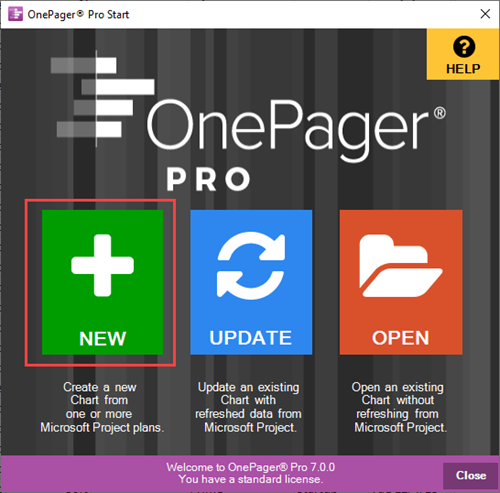
6) If you need to adjust settings in the OnePager current Template Properties form before launching OnePager Pro, click the Template... button on the Micosoft Project ADD-INS ribbon tool bar tab accesses a window with the Template Properties form which can be edited and saved.
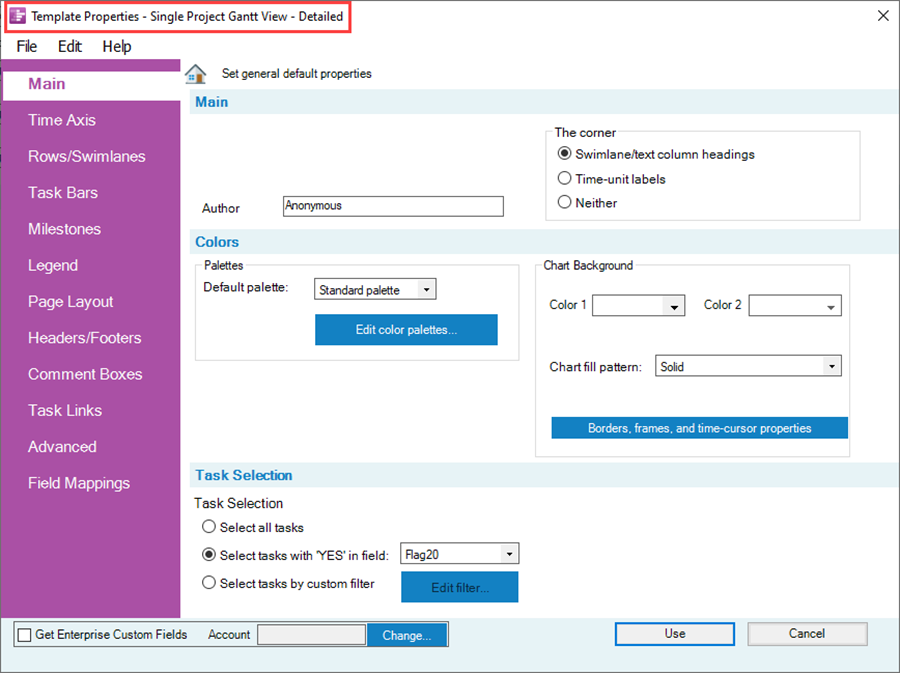
7) The Template Properties form is very similar to the OnePager Chart Properties form which is described elsewhere.
8) Once the desired edits to the current Template Properties form are made, save the Template Properties formand return to paragraph 5) above.
9) At the completion of paragraph 5) when you click the NEW button, OnePager accesses the OnePager choices (OPC) form as shown below:
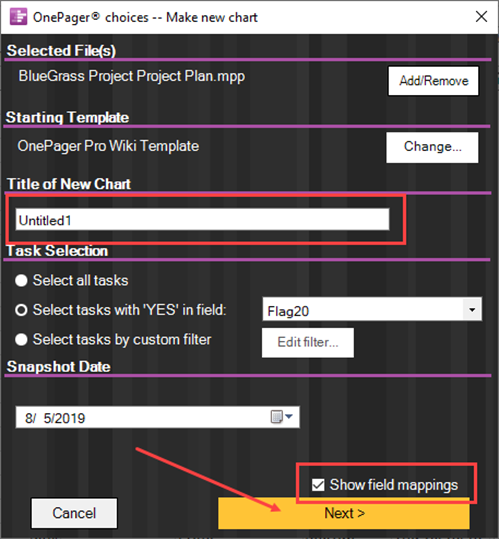
10) It is recommended that the chart name selected refer to both the project and, perhaps, be familiar to the audience that is likely to view the completed OnePager chart.
11) Additionally, notice that the Select Tasks with ‘YES’ in field: is showing Flag20 as a default.
12) Most users select Flag20 to tell OnePager which tasks and milestones to import but any of the 20 Flag fields or any of the 20 Number fields can be used.
13) It is important that the Flag field number represented in this window correspond to the Flag field containing the Yes and No data placed in the Microsoft Project source plan.
14) The Snapshot date represents the time now or as-of date for the chart you are about to create.
15) If the date created by OnePager does not reflect the status date required, change the date by using the calendar dropdown window.
16) As the source plan changes later on, you can create additional snapshots to show changes consistently.
17) Finally, note that the Show field mappings checkbox is checked as shown above.
18) Checking this checkbox ON and pressing the Next> button takes you to the second page of the OPC form shown below:
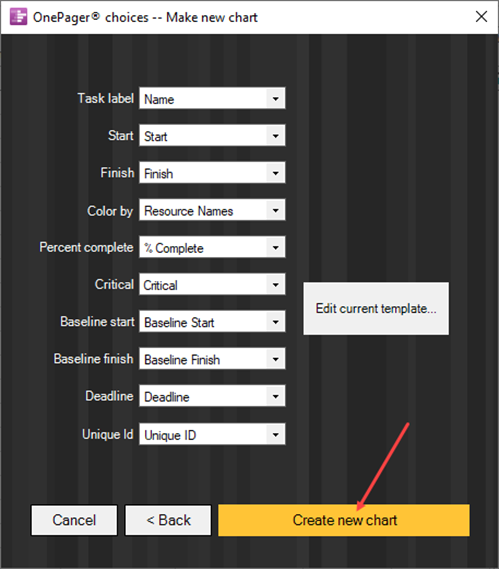
19) This form allows you to edit which Microsoft Project source plan fields are used for various purposes such as task name and start date.
20) The Edit current template button also gives you a second chance to change many more initial properties of the chart.
21) Once these choices are confirmed or changed, click the Create new chart button and OnePager imports the flagged data and make the chart.
22) Once the chart is produced, you can edit it such as by clicking shapes and using the controls on the ribbon or right-clicking, double-clicking, or dragging the shapes.
23) When the desired editing is complete, click the Copy to Clipboard button on the ribbon and paste the chart into a Microsoft PowerPoint presentation, email message, or Microsoft Word document.
24) If the chart contains more than one page, you can choose to copy the entire document, the last page (current page), or a selected numerical page to the clipboard.
25) OnePager can save all charts and snapshots after editing.
Related Links
Creating a NEW Chart via Pull Operation - OnePager Pro 7.13.1-70
Creating a NEW Chart via Pull Operation - OnePager Express 7.13.2-70
REPLACING a Snapshot via Pull Operation - OnePager Pro 7.14.1-70
REPLACING a Snapshot via Pull Operation - OnePager Express 7.14.2-70
ADDING a Snapshot via Pull Operation - OnePager Pro 7.15.1-70
ADDING a Snapshot via Pull Operation - OnePager Express 7.15.2-70
Custom Update (Replacing) of a Snapshot via Pull Operation - OnePager Pro 7.16.1-70
Custom Update (Replacing) of a Snapshot via Pull Operation - OnePager Express 7.16.2-70
Using the OnePager "Data" Tab's "Selected file(s)" Button 7.17.1-70
(7.1.1-70)